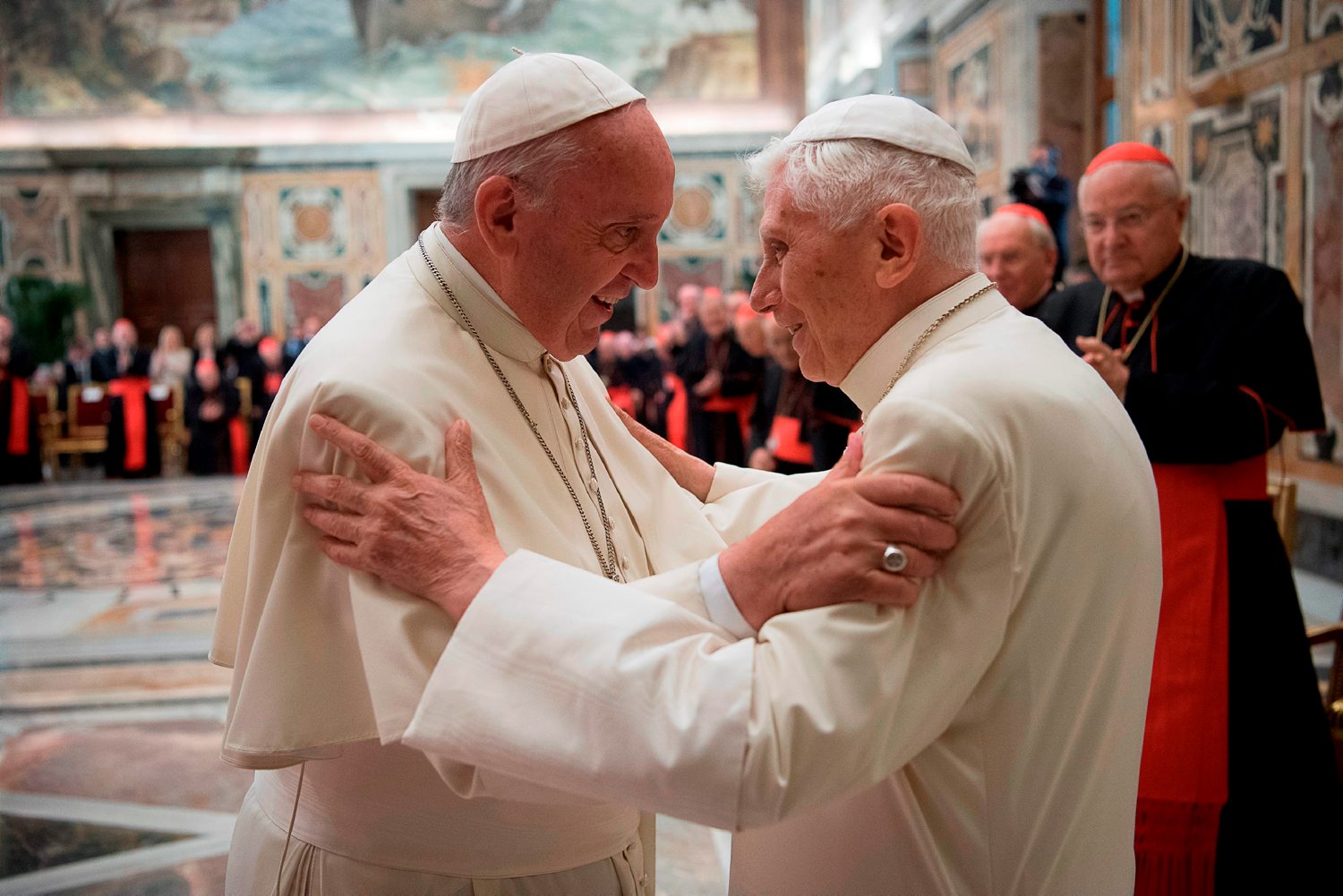Brothers in Arms: How Benedict Is Helping Francis Fight Intrigue in the Vatican
By Michael Kelly
To the casual observer, Pope Francis's recent admission that he believes retired Pope Benedict XVI "had my back" over the past three years may seem like nothing more than a polite hat-tip to his predecessor. But the remark actually reveals a deep undercurrent of resistance to reform that Benedict's steady presence in a small residence in the Vatican gardens is helping the Argentine Pope overcome. It's not by accident that when Francis gives public addresses, he reserves his sharpest criticism for Vatican officials. While the overwhelming majority of people who work in the Church's central administration are dedicated and hard-working officials, there has long been a hard-core element machinating against reform, often for alleged financial gain. It has long been a staple of the Italian press to report on controversial allegations emanating from the Holy See - whether it has been links to the Sicilian Mafia or Masonic bodies, there has been plenty of smoke. When Jorge Bergoglio was elected Pope three years ago, the first item in his in-tray was a blistering 300-page report from a special commission that his predecessor Benedict XVI had established to investigate alleged corruption in the heart of the Vatican. Many observers think that it was the details in this report that precipitated the unprecedented resignation of the German Pontiff. In stepping down, Benedict made it known that his work was done - he would not act on the report, but instead would leave it for his successor. To describe the last years of Benedict's papacy as turbulent would be an understatement. In an emotional farewell address in 2013, Benedict told pilgrims that there were times "when the seas were rough and the wind blew against us and it seemed that the Lord was sleeping". It was an oblique reference to what has become known as 'Vatileaks', a scandal that culminated in Benedict's closest aide, Paolo Gabriele, being imprisoned after stealing confidential documents from the Pontiff's private study in the papal apartment. But far from being an act of treachery, Gabriele's theft and subsequent leaking of documents that exposed financial mismanagement was a cack-handed attempt to throw the Pope a lifeline and thwart those in the highest echelons of the Roman Curia who were resisting Benedict's attempts to clean up the house. But, ultimately, Benedict didn't feel up to the fight and when the cardinals met to select a new Pope in 2013, with Vatican financial reform top of the agenda, it was the Archbishop of Buenos Aires they chose. And Francis has hit the ground running. Whether it is setting up new watchdogs to monitor the Vatican Bank or clearing out dysfunctional offices, he has moved with abandon and upset vested interests along the way. But Benedict has proved himself both a loyal son of the Church and an obedient servant of the new regime. It's no secret Benedict and Francis have different styles. Benedict has a fondness for liturgical practices that leave Francis cold. The German former professor thinks and speaks with the clarity of a theologian, while the Argentine former nightclub bouncer has a freewheeling style when it comes to communications. But the Pope is the Pope and Francis revealed this week that Benedict had even chastised some nostalgic faithful who were complaining about the "new Pope". Benedict has consistently made it clear that he is no rival to Francis. In refusing to host a rival court, he has left no space for Francis's detractors to find succour within the walls of the Vatican. His stubborn rejection of involvement in the day-to-day activities of the Holy See also means disgruntled officials are unable to cloak their critique with phrases like "well, Benedict thinks…" or "the previous Pope says…" There's also the fact that Benedict XVI spent 25 years working in the Vatican before his election in 2005. He won huge respect from mandarin curialists for his understanding of their often eccentric patterns of behaviour. It was, arguably, this deference to the curious ways of Vatican intrigue that left Benedict impotent when it came to implementing much-needed reforms. But, just as only an unyielding opponent of communism like Richard Nixon could establish US-China relations, perhaps only Benedict XVI can offer the background support that Francis needs to push his radical reform agenda. As long as Benedict makes it known that he is an unwavering supporter of the Francis-era reforms, those senior officials hostile to reform have no option but to bite their lips. Perhaps Benedict's emergence as a potent but unlikely bodyguard for Francis should come as less of a surprise. Benedict's pre-papal Vatican role as Prefect of the Congregation for the Doctrine of the Faith was essentially as a watchdog to guard the Catholic faith. After the election of Pope Francis, Benedict was first on the phone to pledge his loyalty and reminded cardinals that their absolute duty was to serve the new Pope. Francis's assurance that Benedict "had my back" over the past three years is a natural extension of the 89-year-old German's instinct to protect the Church and the Church's chief shepherd, the Pope. And it's clearly mutual: speaking this week at an event to mark the 65th anniversary of his priestly ordination, Benedict said that he too "feels protected" by Francis. It's a far cry from a narrative that wants to see the two men in opposition to one another. And, while the absence of a rival court certainly makes reporting life at the Vatican less interesting for the Roman press corps, it empowers Francis to push ahead with the reforms that Catholics long for. Michael Kelly is editor of 'The Irish Catholic'
|
.
Any original material on these pages is copyright © BishopAccountability.org 2004. Reproduce freely with attribution.
